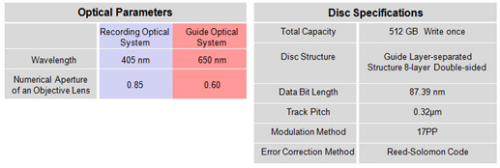Pioneer Corporation and Memory-Tech Corporation have jointly developed a high-capacity optical disc for data archiving with a capacity of 256 GB on a single side. With the use of double-sided disc technologies, capacity can be expanded up to 512 GB.

Recently there has been growing interest in digital archiving where information such as source materials and official documents held at libraries and art galleries are digitized and stored long-term, and the total volume of stored digital data is expected to rapidly increase in the coming years. As well as offering lower maintenance costs compared with other technologies, the use of optical discs to record and save information is recognized for its high reliability, such as its excellent recording recall factor when exposed to disasters such as flooding, and further advances in capacity are required.
The high-capacity optical disc for data archiving developed by Pioneer and Memory-Tech employs a guide layer-separated multi-layer disc structure which separates the recording layers and guide layers, and by stacking eight recording layers on a single side of an optical disc, achieves the high capacity of 256 GB. With the use of double-sided disc technologies, recording capacity of up to 512 GB on a single disc can be ensured. Moreover, the discs feature excellent compatibility with existing formats. For instance, the developed optical discs recorded using a compliant recording device can be played back on Blu-ray Disc™ compliant drives (Some pickup and firmware modifications required).
While giving ongoing consideration to the introduction of next-generation high-capacity optical discs for the data archiving market, which is expected to undergo a growth in demand, Pioneer and Memory-Tech will continue to engage in research and development and strive to achieve further advances in the capacity of optical discs.
It should also be noted that during the development process, technical cooperation is being received from media manufacturer Mitsubishi Kagaku Media Co., Ltd. and discussions aimed at market introduction are underway.
Features of the High-capacity Optical Disc for Data Archiving
1 ) Guide Layer-separated Multi-layer Disc Structure
By eliminating the guide grooves (tracks) present in the recording layers of conventional optical discs and adopting a guide layer-separated multi-layer disc structure that separately establishes dedicated guide layers for the guide grooves, the disc structure has been simplified. This makes it easier to stack recording layers, essential for expanding disc capacity, as well as reducing disc manufacturing costs and achieving improved manufacturing yields.

2 ) Capacity of up to 512 GB Possible with the Use of Double-sided Disc Technologies
By stacking eight recording layers capable of recording 32 GB per layer, recording capacity of 256 GB on the single side of a disc has been achieved. In addition, with the use of double-sided disc technologies, a capacity of up to 512 GB on a single disc can be achieved. High-speed recording is also supported, allowing recording at up to 4x speed (Blu-ray Disc™ format standard).
3 ) High Compatibility with Existing Formats
Recorded optical discs can also be played back in Blu-ray Disc™ compliant drives* without the use of special signal processing. In addition, the optical disc recording devices employ the same optical specifications (recording laser wavelength, objective lens, etc.), error correction method and encoding method as Blu-ray Disc™ drives, and are able to record to and play back existing Blu-ray™ discs.
4 ) Highly Expandable
Pioneer and Memory-Tech have also used this technology to successfully produce a prototype single-sided 10-layer sample disc. In addition, by repurposing existing signal processing technologies, the two companies have confirmed that double-sided capacities of up to 720 GB can be achieved without modification to recording devices. What’s more, by using new signal processing methods to increase the per-layer recording capacity and stack 12 or more layers, the feasibility of capacities of 1TB or greater are being considered.

